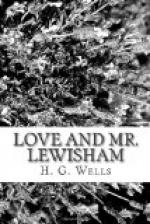Presently he found himself humming a languid tune, and thinking again of the quarrel that he had imagined banished from his mind. What in the name of destiny had it all been about? He had a curious sense that something had got loose, was sliding about in his mind. And as if by way of answer emerged a vision of Whortley—a singularly vivid vision. It was moonlight and a hillside, the little town lay lit and warm below, and the scene was set to music, a lugubriously sentimental air. For some reason this music had the quality of a barrel organ—though he knew that properly it came from a band—and it associated with itself a mystical formula of words, drawing words:—
“Sweet dreamland fa—ces,
passing to and fro,
Bring back to mem’ry
days of long ago—oh!”
This air not only reproduced the picture with graphic vividness, but it trailed after it an enormous cloud of irrational emotion, emotion that had but a moment before seemed gone for ever from his being.
He recalled it all! He had come down that hillside and Ethel had been with him....
Had he really felt like that about her?
“Pah!” he said suddenly, and reverted to his books.
But the tune and the memory had won their footing, they were with him through his meagre lunch of milk and scones—he had resolved at the outset he would not go back to her for the midday meal—and on his way to Vigours’ they insisted on attention. It may be that lunching on scone and milk does in itself make for milder ways of thinking. A sense of extraordinary contradiction, of infinite perplexity, came to him.
“But then,” he asked, “how the devil did we get to this?”
Which is indeed one of the fundamental questions of matrimony.
The morning tumults had given place to an almost scientific calm. Very soon he was grappling manfully with the question. There was no disputing it, they had quarrelled. Not once but several times lately they had quarrelled. It was real quarrelling;—they had stood up against one another, striking, watching to strike, seeking to wound. He tried to recall just how things had gone—what he had said and what she had replied. He could not do it. He had forgotten phrases and connexions. It stood in his memory not as a sequence of events but as a collection of disconnected static sayings; each saying blunt, permanent, inconsecutive like a graven inscription. And of the scene there came only one picture—Ethel with a burning face and her eyes shining with tears.
The traffic of a cross street engaged him for a space. He emerged on the further side full of the vivid contrast of their changed relations. He made a last effort to indict her, to show that for the transition she was entirely to blame. She had quarrelled with him, she had quarrelled deliberately because she was jealous. She was jealous of Miss Heydinger because she was stupid. But now these accusations faded like smoke as he put them forth. But the picture of two little figures back there in the moonlit past did not fade. It was in the narrows of Kensington High Street that he abandoned her arraignment. It was beyond the Town Hall that he made the new step. Was it, after all, just possible that in some degree he himself rather was the chief person to blame?




